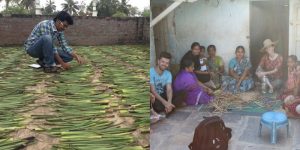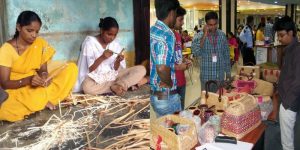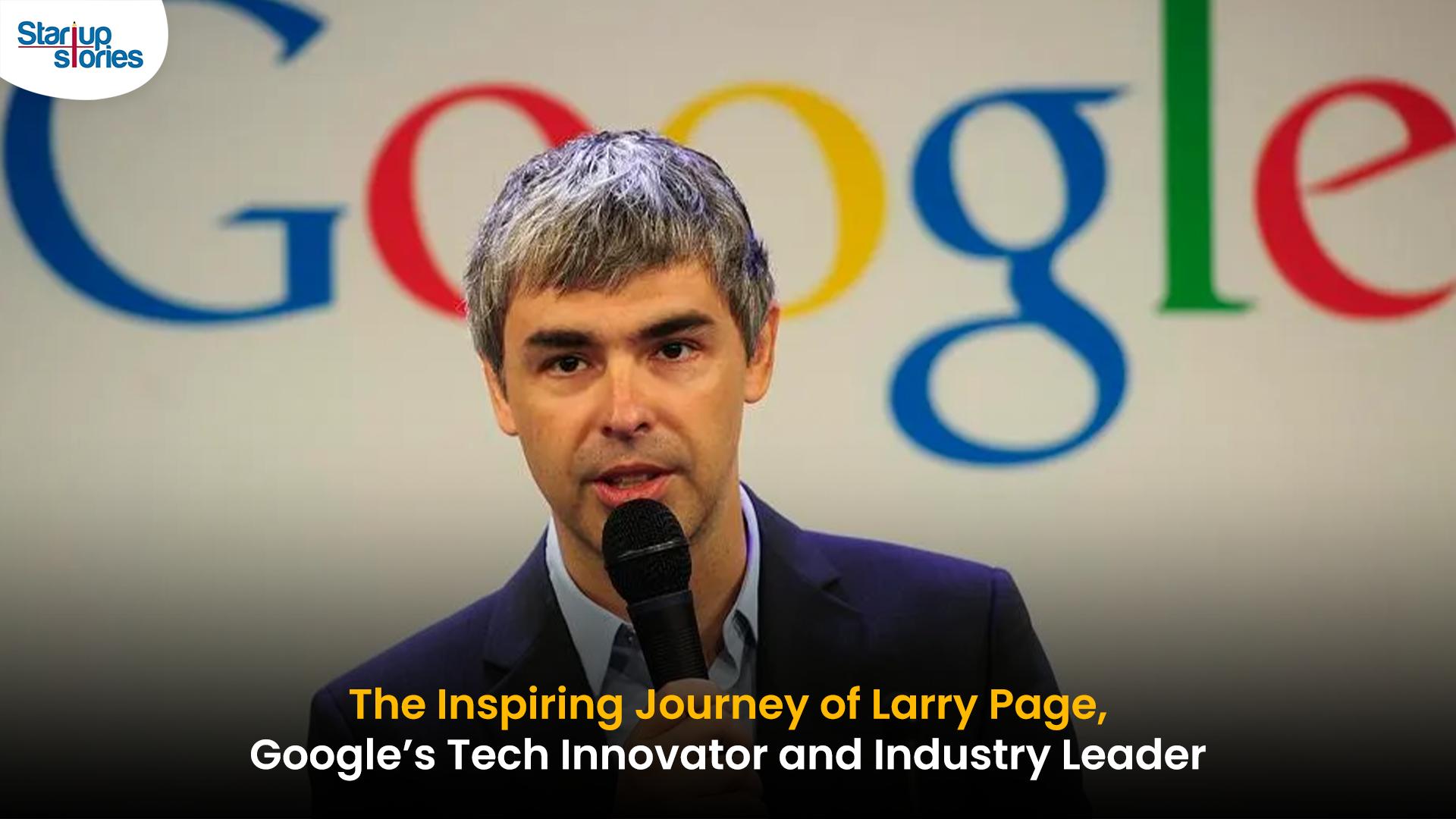Entrepreneur Stories
Meet Mujeeb: A Man Using Water Hyacinths To Make Handicrafts And Provide Livelihood To Poor Women

Shaik Abdul Mujeeb is a common man in India who chose an uncommon profession of collecting weeds from water bodies and making handicrafts out of them. Ultimately, it is all about providing occupation to poor women in the Southern region of India.
On his way to college in Andhra Pradesh, Abdul noticed the enormous growth of water hyacinth in lakes. Later, he observed many ponds and lakes too were filled with these hyacinth weeds.
Abdul is very much aware of the damage caused by these weeds. Lakhs of rupees are spent every year by the government to clear these weeds, as these weeds are known to block the exit points of the water bodies. In a span of 45 days, they decay and contaminate the water making aquatic life a bit difficult to survive.

Shaik Abdul Mujeeb’s journey started by collecting these plants, cut their stems, drying them in the sun and making hats out of them. During this process, he learned that a similar practice was going on in Assam too. Seeking help from the Manager of NEDFi, he visited some places in Assam and learned the art of making various handicrafts.
In October 2014, he started a social enterprise and named it Allika that provides sustainable lifestyles to poor women who beautifully handcraft various products from water hyacinths.

Allika was started initially with six women, and now is supporting 70 women. It trains them to create handicrafts from water hyacinths. A wide range of products can be created like handbags, caps, hats, baskets, home decors, dining mats and much more. These products have a shelf life of about 10 years.
‘Allika’ also provides an opportunity to generate income for 30 men who are employed to collect weeds from various locations of Andhra Pradesh. These people especially women raised their standard of living and also provide education to their children.
“We make sales through our Facebook page and some exhibitions in our city. We still need to meet the demand and we are trying to expand and make new products,” says Abdul.
Abdul shared his future plans saying that he wants to put the entire plant of water hyacinth to use. It’s roots and leaves to be used for organic manure. And also make sanitary pads from the fiber of the water hyacinth.
Videos
T.N. Seshan: The Fearless Reformer Who Redefined Indian Democracy

T.N. Seshan’s name stands tall in India’s history as the man who transformed the nation’s electoral system with extraordinary courage and integrity. Born in 1932 in Kerala, Seshan grew up with values of discipline, education, and service to the nation — virtues that shaped his illustrious journey. From his early brilliance at Madras Christian College to his advanced studies in public administration at Harvard University, Seshan’s path reflected rare determination and intellect. Joining the Indian Administrative Service in 1955, he built a reputation as a no‑nonsense officer committed to efficiency and honesty, serving in key roles such as Secretary of Defense and overseeing vital national programs.
As the Chief Election Commissioner of India in 1990, T.N. Seshan sparked a new era of electoral integrity. In a system once marred by corruption, violence, and malpractice, Seshan brought order, fear, and respect through his groundbreaking reforms. He introduced voter ID cards, imposed strict spending limits on campaigns, and insisted on transparency at every level of the election process. Despite criticism from political circles that labeled him dictatorial, his relentless pursuit of fairness empowered every citizen to vote fearlessly. Under his leadership, the Election Commission became a symbol of strength and integrity in Indian democracy.
Seshan’s passing in November 2019 marked the end of an era, but his message continues to resonate across generations. Leaders from every corner of the country mourned the loss of the man who restored faith in free and fair elections. His enduring legacy reminds us that true leadership lies not in wielding power, but in serving people with honesty, courage, and conviction. T.N. Seshan’s life remains a timeless inspiration a reminder that democracy thrives only when its citizens are vigilant, responsible, and fearless.
Entrepreneur Stories
Indian Man Quits JPMorgan, Takes 70% Pay Cut to Launch $6 Million Startup

Leaving behind a high-paying job at JPMorgan, an Indian entrepreneur embraced a 70% salary cut to pursue true purpose and passion in the startup world. Disenchanted with what he described as a “robotic” corporate routine, he sought meaningful work that made a real impact. This pivotal decision marked the beginning of his new journey, one focused on value creation rather than titles and corporate perks.
Powered by resilience and fresh perspective, the entrepreneur launched his own startup, prioritizing innovation and hands-on solutions. The road was challenging, but his vision resonated with the market: the startup quickly gained traction and raised $6 million—an impressive acknowledgement of its potential in a competitive landscape. Every hard lesson from early setbacks and bootstrapping paid off in real customer growth and investor confidence.
Today, his journey stands as an inspiring example for professionals seeking authentic success outside the corporate grind. By trading comfort for creative freedom, he grew a venture that solves important problems, generates jobs, and builds wealth beyond just salary. For ambitious founders, his story highlights the power of risk-taking, adaptability, and relentless focus on impact in India’s thriving startup ecosystem.
Videos
Larry Page: The Visionary Co-Founder Behind Google’s Global Success

Larry Page is a visionary technology entrepreneur and co-founder of Google, one of the world’s most influential companies. Born in 1973 in Michigan, Page grew up surrounded by computer technology, which inspired his passion for innovation from an early age. He studied computer engineering at the University of Michigan and later pursued his PhD at Stanford University, where he developed the revolutionary PageRank algorithm with Sergey Brin. This technology fundamentally changed the way search engines rank websites, making Google the most accurate and popular search engine globally.
The journey of Larry Page and Google began in 1998 when they officially launched the search engine from a small garage. Leveraging their unique algorithm, Google quickly surpassed competitors due to its ability to deliver highly relevant search results, transforming internet search forever. Under Larry Page’s leadership as CEO, Google expanded beyond search to launch groundbreaking products including YouTube, Gmail, and Google Maps, turning it into a global tech powerhouse that shapes how we access and interact with information online.
Larry Page later became the CEO of Google’s parent company, Alphabet Inc., driving innovation and investment in next-generation technologies such as artificial intelligence, autonomous vehicles, and healthcare solutions. His visionary leadership and commitment to technological advancement have cemented his legacy as one of the most influential figures in the tech industry. Today, Larry Page remains a key influencer in shaping the future of technology and digital innovation worldwide.








Pingback: Meet Mujeeb: A Man Using Water Hyacinths To Make Handicrafts And Provide Livelihood To Poor Women – allikaecoproducts.com
MM88
November 6, 2025 at 10:11 am
Khám phá thế giới giải trí trực tuyến đỉnh cao tại MM88, nơi mang đến những trải nghiệm cá cược thể thao và casino sống động.
站群程序
November 11, 2025 at 4:47 am
搭载智能站群程序,自动化搭建与管理,为SEO项目提供核心驱动力。站群程序
MM88
November 12, 2025 at 7:41 am
Với giao diện mượt mà và ưu đãi hấp dẫn, MM88 là lựa chọn lý tưởng cho các tín đồ giải trí trực tuyến.
ios超级签
November 13, 2025 at 4:27 am
苹果签名,苹果超级签平台,ios超级签平台ios超级签苹果企业签,苹果超级签,稳定超级签名
J88
November 17, 2025 at 8:14 am
Đến với J88, bạn sẽ được trải nghiệm dịch vụ cá cược chuyên nghiệp cùng hàng ngàn sự kiện khuyến mãi độc quyền.
GO88
November 29, 2025 at 1:41 am
Tham gia cộng đồng game thủ tại Go88 để trải nghiệm các trò chơi bài, poker phổ biến nhất hiện nay.
chanced casino
December 19, 2025 at 9:03 am
chanced casino chanced casino
Casino Cashback Aktion
December 21, 2025 at 6:22 pm
Gamomat-Titel wie “Books & Bulls” und “Crystal Ball” bieten vertraute
Spielmechaniken für erfahrene deutsche Automaten-Fans.
Die Jackpot-Beträge werden in Euro angezeigt und berücksichtigen deutsche
Steuergesetze mit automatischen Hinweisen für
Gewinne über 1.000 €. Klassische 3-Walzen-Automaten wie “Fruits’n Sevens”
und “Hot Spot” sprechen traditionelle deutsche Spieler an, die
Einfachheit und nostalgia schätzen. Unser System berücksichtigt deutsche Feiertage mit speziellen Bonusaktivierungen an Weihnachten, Ostern und regionalen Feiertagen wie dem Oktoberfest.
Unsere Wettanforderungen folgen europäischen Marktstandards mit 35-fachem Umsatz für Geldbonus und 40-fachem
Umsatz für Freispielgewinne. Der 100%-Einzahlungsbonus erreicht maximal 800 € und verdoppelt das
verfügbare Spielkapital sofort.
Als erstes haben wir hier einen beeindruckenden Ersteinzahlungsbonus.
Zugegeben, nach 10 Jahren als Casino-Profi bin ich immer noch
beeindruckt von den Boni, die CadoolaCasino seinen Spielern bietet.
Besonders erwähnenswert ist hier der Willkommensbonus, welcher aus meiner Sicht
sehr großzügig bemessen ist. In Bezug auf die Boni bietet Cadoola einige ziemlich attraktive Angebote.
Cadoola hat die magische Mischung – über 2.500 Spiele
von Top-Anbietern, einen Willkommensbonus von 800 EUR und rund um die Uhr mehrsprachigen Support.
References:
https://online-spielhallen.de/cobra-casino-promo-code-ihr-schlussel-zu-mehr-spielspas/